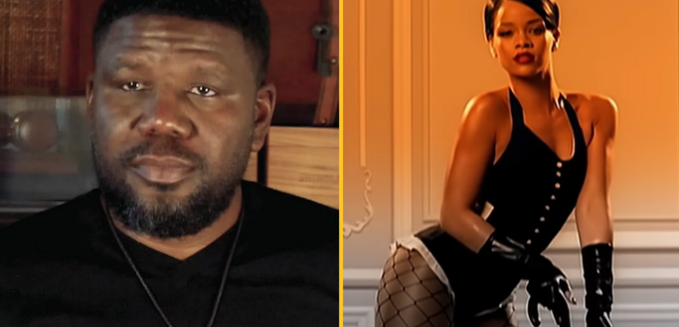Lifestyle
Priest Claims Demons Sing Rihanna’s Song In Hell

In a shocking revelation, Michigan priest Gerald Johnson has come forward with a harrowing account of his alleged journey to Hell following a heart attack in 2016. The priest claims that he temporarily died and was denied entry into Heaven, instead plummeting into the depths of Hell where he was subjected to a torturous soundtrack of demonic karaoke. Johnson, who has been a pastor for over 20 years, took to TikTok to share his bizarre experience, which has since gone viral with over 4 million views.
According to the priest, his spirit left his physical body during the heart attack, and he found himself descending into the center of the Earth, where Hell is located. As he entered the fiery inferno, Johnson was met with the eerie sound of demons singing popular hits, including Rihanna’s ‘Umbrella’ and Bobby McFerrin’s ‘Don’t Worry Be Happy’.
The priest claims that the music was not for entertainment purposes but was instead used to torment those in Hell.
Johnson described the experience as indescribable and emotional, stating that the lyrics of the songs took on a whole new meaning in the context of Hell. Every lyric to every song is to torment you, he said. The priest also claimed to have witnessed other gruesome scenes, including a man being burned alive while being held by a demon with chains around his neck.
Johnson believes that his experience is proof that popular music is inspired by demons and is used to control people on Earth. He warns others to be mindful of the music they listen to and to avoid unforgiveness, which he claims was the root of his own descent into Hell.
God doesn’t send people to Hell, people send themselves to Hell, Johnson said in his viral clip. This shocking tale has left many wondering about the nature of Hell and the role of music in the afterlife. While some have dismissed Johnson’s claims as mere fantasy, others believe that his experience serves as a warning to those who choose to indulge in secular music over hymns and prayers. As the debate rages on, one thing is certain – Priest Gerald Johnson’s harrowing account of Hell’s soundtrack has left a lasting impression on those who have heard it.
Lifestyle
The Pitt, The Studio Dominate 2025 Emmy Awards

The Pitt, The Studio Dominate 2025 Emmy Awards
Hollywood’s biggest television stars gathered on Sunday night for the 2025 Emmy Awards, where two productions, The Pitt and The Studio, emerged as the night’s biggest winners.
The Pitt, a gripping medical drama set in a bustling emergency room, clinched the coveted Best Drama Series, while The Studio, a satirical comedy about Hollywood politics, not only won Best Comedy Series but also shattered Emmy records with a clean sweep across multiple categories.
In a defining moment of the ceremony, veteran actor Noah Wyle earned his first-ever Emmy after decades in television, winning Lead Actor in a Drama Series for his performance in The Pitt.
Wyle, visibly moved, dedicated the award to healthcare workers worldwide, describing the show’s success as “a reflection of the courage and sacrifice of those who save lives every day.”
Seth Rogen’s The Studio proved unstoppable in the comedy category, taking home 13 trophies — the highest number of wins for a comedy series in a single year, according to the Television Academy.
Rogen, who co-created and starred in the show, also walked away with Lead Actor in a Comedy Series, his first Emmy.
He called the triumph “the proudest moment” of his career.
Critics have hailed The Studio for its sharp wit and insider satire, offering audiences a humorous but piercing look into Hollywood’s inner workings.
The series’ record-breaking feat now places it among the most celebrated comedies in Emmy history.
Industry watchers say the dual success of The Pitt and The Studio signals a shift in Hollywood storytelling, with both shows reflecting real-world struggles and triumphs in institutions — healthcare and entertainment — that resonate with global audiences.
The victories came against formidable contenders including Severance and Abbott Elementary, underscoring the appetite for fresh narratives that balance cultural depth with entertainment.
As the night drew to a close, the Emmy spotlight rested squarely on The Pitt and The Studio — productions that not only entertained millions but also reinforced television’s enduring power to mirror society.
Lifestyle
Jay-Z Emerges World’s Richest Musician with $2.5bn Net Worth — Forbes

Jay-Z Emerges World’s Richest Musician with $2.5bn Net Worth — Forbes
American rap icon and business mogul, Sean Carter, better known as Jay-Z, has been declared the world’s richest musician by Forbes with an estimated net worth of $2.5 billion.
The Roc Nation founder’s fortune cuts across multiple ventures, including his luxury champagne brand, Armand de Brignac (Ace of Spades), cognac label D’Ussé, and his stakes in real estate, hospitality, technology, and startups.
He also reaped huge gains from the sale of music streaming platform Tidal and his former clothing line, Rocawear.
Jay-Z’s rise to the top further cements his reputation as not only a cultural force but also one of the most successful music entrepreneurs globally.
On the female side, American pop star Taylor Swift retained her crown as the richest female musician, with a net worth of $1.6 billion.
Forbes noted that Swift remains the first artist in history to attain billionaire status solely from music and touring earnings.
Lifestyle
Single Mothers Can’t Raise Boys Into ‘Proper Men’ – Jim Iyke

Single Mothers Can’t Raise Boys Into ‘Proper Men’ – Jim Iyke
Nollywood star, Jim Iyke, has stirred controversy with his recent remarks on parenting, insisting that single mothers cannot raise a boy into a “proper man” without the presence of a male figure.
Speaking during an interview with Okay 101.7 FM in Accra, Ghana, the actor argued that women are naturally built to nurture but lack the disciplinary balance needed to raise boys into men.
“A woman can’t raise a man. You can’t, you’re not built for it. A single mother cannot raise a man properly. You need a male influence – go get your brother that’s doing well or your father or even any man that you trust. There has to be a male presence in it [raising a boy child],” Iyke said.
He further maintained that boys require strict guidance from men in order to grow into disciplined adults.
“Because women are naturally built to nurture, to love. And then what you’re going to raise is a very weak man? He is going to be everything like the men that left you. You need somebody that would discipline him, tell him ‘No’ as often times as possible, and put him in the grind,” he added.
Iyke’s remarks have since triggered heated debates across social media, with some agreeing with his perspective while others accused him of undermining the struggles of single mothers who successfully raise responsible children without male support.
The actor, who has often been outspoken on social issues, did not back down on his position, stressing that the absence of a male role model leaves a critical gap in raising boys.
-

 News7 days ago
News7 days agoTrump Hails ‘Turnaround for the Ages’ in Record 110-Minute Address
-

 News7 days ago
News7 days agoMexico in Turmoil After CJNG Kingpin Killed in Military Operation
-

 Analysis6 days ago
Analysis6 days agoSavannah Shield and the Security Recalibration of Kwara State
-

 Analysis6 days ago
Analysis6 days agoWho Is After Peter Obi? By Boniface Ihiasota
-

 News6 days ago
News6 days agoCARICOM Chair Engages Guyana in Fresh Push for Regional Integration
-

 News6 days ago
News6 days agoUK Court Hears Recordings in Diezani Bribery Trial









